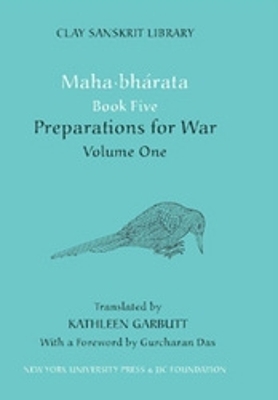
Mahabharata Book Five (Volume 1)
Preparations for War
Seiten
2008
New York University Press (Verlag)
978-0-8147-3191-8 (ISBN)
New York University Press (Verlag)
978-0-8147-3191-8 (ISBN)
- Lieferbar
- Versandkostenfrei
- Auch auf Rechnung
- Artikel merken
The Pandavas believe they have completed the terms of their exile, though Duryodhana claims that they did not live unknown for the full thirteenth year, since Arjuna was recognized in the battle at the end of the preceding book, "Virata". This volume constantly highlights the inevitability of conflict and the futility of negotiation.
The Pándavas believe they have completed the terms of their exile, though Duryódhana claims that they did not live unknown for the full thirteenth year, since Árjuna was recognized in the battle at the end of the preceding book, Viráta. While the Pándavas and Kurus make their preparations for war they organize a series of embassies to negotiate peace. This volume constantly highlights the inevitability of conflict and the futility of negotiation. Most characters are concerned that war between family cannot fail to be sinful. Contained herein is the “Sanat·sujatíya,” a philosophical passage to rival the “Bhagavad·gita.” Like the “Bhagavad·gita,” the “Sanat·sujatíya” tells that karma will not chain one in the cycle of rebirth, if one refrains from desire. Through understanding the truth of non-duality, that the world is mere illusion, one is subsumed into eternal existence with Brahman.
Co-published by New York University Press and the JJC Foundation
For more on this title and other titles in the Clay Sanskrit series, please visit http://www.claysanskritlibrary.org
The Pándavas believe they have completed the terms of their exile, though Duryódhana claims that they did not live unknown for the full thirteenth year, since Árjuna was recognized in the battle at the end of the preceding book, Viráta. While the Pándavas and Kurus make their preparations for war they organize a series of embassies to negotiate peace. This volume constantly highlights the inevitability of conflict and the futility of negotiation. Most characters are concerned that war between family cannot fail to be sinful. Contained herein is the “Sanat·sujatíya,” a philosophical passage to rival the “Bhagavad·gita.” Like the “Bhagavad·gita,” the “Sanat·sujatíya” tells that karma will not chain one in the cycle of rebirth, if one refrains from desire. Through understanding the truth of non-duality, that the world is mere illusion, one is subsumed into eternal existence with Brahman.
Co-published by New York University Press and the JJC Foundation
For more on this title and other titles in the Clay Sanskrit series, please visit http://www.claysanskritlibrary.org
Kathleen Garbutt translates and edits Sanskrit literature full time for the JJC Foundation, co-publishers (with NYU Press) of the Clay Sanskrit Library.
| Erscheint lt. Verlag | 1.5.2008 |
|---|---|
| Reihe/Serie | Clay Sanskrit Library |
| Übersetzer | Kathleen Garbutt |
| Verlagsort | New York |
| Sprache | englisch |
| Maße | 114 x 165 mm |
| Gewicht | 499 g |
| Themenwelt | Literatur ► Historische Romane |
| Geisteswissenschaften ► Religion / Theologie ► Hinduismus | |
| ISBN-10 | 0-8147-3191-0 / 0814731910 |
| ISBN-13 | 978-0-8147-3191-8 / 9780814731918 |
| Zustand | Neuware |
| Haben Sie eine Frage zum Produkt? |
Mehr entdecken
aus dem Bereich
aus dem Bereich
Buch | Hardcover (2012)
Westermann Schulbuchverlag
CHF 44,90
Schulbuch Klassen 7/8 (G9)
Buch | Hardcover (2015)
Klett (Verlag)
CHF 29,90
Buch | Softcover (2004)
Cornelsen Verlag
CHF 23,90


